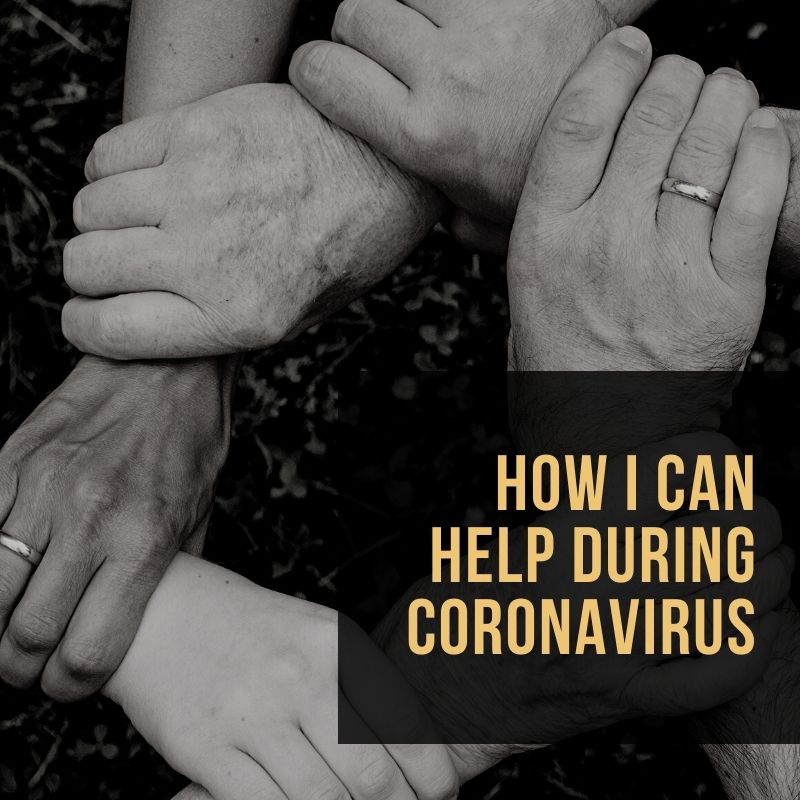The COVID-19 virus has become an increasing presence in our lives. There will be many profound effects this virus will have on our society, as the virus gives us feelings of uncertainty and scare.
However, while it is easy to feel powerless in our situation, there are ways to help. Many are asking themselves the very question of “How Can I Help?” despite those feelings of ambiguity.
Here are some ways you can contribute:
- Donate/Volunteer:
- Donate money to those helping the hungry or sick. Meals on Wheels will safely deliver food to American senior citizens who will be unable to leave their homes. The charity will make sure the elderly is not left to fend for themselves.
- Save the Children started a Coronavirus Response Fund to help families and protect their children. They will provide training and equipment for healthcare teams and protect children, should their families be subject to quarantine.
- The Center for Disaster Philanthropy has a COVID-19 Response Fund which will focus on aid efforts, from supporting healthcare workers to implementing prevention strategies.
- Donate to your local food bank. Food banks prefer cash to canned goods, so look in your wallet before cleaning out your pantry.
- Consider donating to your favorite organization if you have the resources. Whether they’re on the front lines of the fight to stop the coronavirus or their mission is entirely unrelated to the current crisis, your donation will make a difference.
- Arts Institutions are taking an immediate hit with the spread of this virus. Support the arts by making a donation to your favorite museum or local arts organization. If an event you were scheduled to attend is cancelled, consider donating the price of your ticket back to the institution. Buy a local artist’s piece of work or merchandise offered online from singers and bands.
- CERF+ has a COVID-19 response fund that is a safety net or artists who contract the virus and are suffering severe health impacts.
- Buy gift cards to local restaurants, stores, hair stylists and local spa to help mitigate their future losses. The restaurant Workers’ Community Foundation started a COVID-19 Emergency Relief Fund to support restaurant workers and their families during this difficult time.
- As blood drives have been cancelled, the American Red Cross encourages healthy, eligible individuals to schedule a blood or platelet donation. The need for blood is constant and volunteers are the only source of blood for those in need of transfusions.
- Donate to the Boys & Girls Clubs of America to help provide groceries to the kids participating in their programs.
- The CDC Foundation is raising emergency funds to enable the CDC to respond to COVID-19.
- Direct Relief provides healthcare workers with lifesaving medical resources like masks, gloves and gowns. They are delivering to locations with confirmed cases and you can donate to help their cause.
- Help First Book donate books to children who don’t have internet access or home libraries.
- Help lawyers help people by donating to the Lawyers for Good Government Foundation. They are helping those who are seeking asylum at the border and those in refugee camps that can’t practice social distancing who also need access to sanitary products.
- Help the National Association for the Exchange of Industrial Resources donate by donating to them. They help redistribute excess inventory from business to schools, churches and other organizations in need.
- Donate to organizations helping with medical costs. The HealthWell Foundation helps cover prescription co-pays, health insurance premiums, deductibles and coinsurance.
- Hospitals are running low on personal protective equipment and in need of N95 respirator masks, disinfectant wipes, hand sanitizer and liquids, soaps, goggles and disposable gloves. If you have any of these items in your home or see some at the store, your area hospital could use your help. Some hospitals are asking for homemade face masks. The database circulating on Twitter lists hospitals and the kind of supplies you can donate.
- iCouldBe is a student mentorship program where you dedicate one hour each week for the school year. The program provides you with online activities and conversation starters. You could also volunteer for Crisis Text Line, where you would be a remote crisis counselor. The service includes free training on how to answer texts from people who reach out.
- Be Responsible:
- Be responsible and listen to the Center for Disease Control’s recommendations to help prevent spread. It’s our communal responsibility to keep vulnerable individuals from contracting the virus. Practice social distancing. Stay home if you’re sick. Wash your hands often and clean off surfaces. Cover your mouth when you sneeze or cough.
- Waste Not, want not: hopefully our pantries are stocked with necessities, but as grocery shelves continue to empty, it is very important that we use (cook it, eat it, share it, store it) what we have. To cut down on food waste, store it in the proper place, wait to wash produce until you’re ready to use it, freeze anything that you do not expect to use in the near future. Make a stock, start a compost, and eat leftovers.
- Be Safely Social, While Practicing Social Distancing
- Keep tabs on those close to you.
- Call or text neighbors, especially elderly neighbors, to make sure they are okay. If they need something and you have it, offer to leave it outside their front doors.
- If you feel comfortable going outside, consider knocking on the door of an elderly neighbor and chatting through the screen or storm door to offer a bit of comfort.
- Explore ways to connect and volunteer virtually. On the idealist.org website there are volunteer and action opportunities posted. DOROT, a NYC-based organization, whose mission is to alleviate social isolation among the elderly and homebound is looking for volunteers willing to make weekly, friendly phone calls. The Be My Eyes app pairs the blind and visually impaired with volunteers via a video call in order to assist with everyday tasks, such as reading a recipe on the back of a box or selecting a particular article of clothing from the closet. There is a need to maintain person-to-person connection in any safe way that we can.
- You can also volunteer remotely, to services to help the elderly and people who reach out for help.
- Come together to create mutual-aid networks. Think of it as a hyper-local COVID-19 Craigslist where neighbors can post their needs – groceries, translation services, pharmacy runs, even cash to make rent-and others can choose to answer the call.
- If you can take in a pet, considering doing so to help alleviate the shelters by adopting or fostering.
- Take care of yourself. Ensure that you are making safe and smart choices for yourself. For many, doing your part will mean taking care of yourself.
Remember those who are out there on the front lines. Once we are on the other side of this crisis, we’re going to have many people to thank. We may not be able to do much right now, but we can get ahead start in finding ways to show our gratitude.








